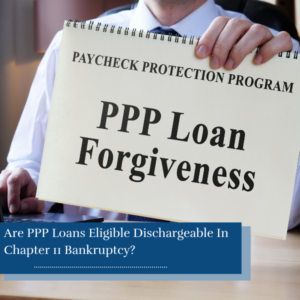Are PPP Loans Eligible Dischargeable In Chapter 11 Bankruptcy?

In response to the economic challenges that arose during the COVID-19 pandemic, the U.S. government initiated the Paycheck Protection Program (PPP) in 2020. This program aimed to help small businesses stay afloat by providing low-interest, forgivable loans that covered payroll, rent, utilities, and other operating expenses.
As businesses emerge from the impact of the pandemic, many are searching for ways to mitigate their financial burdens, including by exploring the possibility of PPP loan forgiveness through Chapter 11 bankruptcy.
How Can I Have My PPP Loan Forgiven?
The U.S. Small Business Administration (SBA) oversees the PPP loan forgiveness process. To qualify for loan forgiveness, you must meet specific criteria, which include the following:
- You must have used the loan funds on eligible expenses, such as payroll, rent, utilities, and mortgage interest payments, within the period the program covered.
- You must have maintained or quickly rehired your employees at their normal salary levels.
- You must show that at least 60 percent of your loan funds went to payroll expenses.
Borrowers who meet these criteria can submit forgiveness applications to their lenders, who then forward applications to the SBA for review and approval.
Is Chapter 11 Bankruptcy a Viable Option?
Chapter 11 bankruptcy allows companies to reorganize their debts while continuing business operations. During the Chapter 11 process, debtors must submit reorganization plans outlining how they will pay their creditors over time. These plans often involve restructuring debts, modifying contracts, and selling assets.
Chapter 11 bankruptcy can offer relief for many types of debt, including PPP loans that do not qualify for forgiveness under the ordinary SBA standards. Like any other debt, loans that were obtained fraudulently are not dischargeable.
An experienced bankruptcy attorney can review your particular situation to determine if Chapter 11 bankruptcy is a good option for handling your unpaid PPP loan, if you may be eligible for forgiveness, or if other options would be the best route for your particular situation.
Pros and Cons of Chapter 11 Bankruptcy
Before considering Chapter 11 bankruptcy, businesses should weigh both the pros and the cons:
- Chapter 11 bankruptcy allows businesses to restructure their debts while continuing operations.
- It provides an opportunity to reduce ongoing expenses by rejecting contracts and leases.
- It prevents creditors from pursuing legal or collection actions during the bankruptcy process.
Cons of Chapter 11 Bankruptcy
- The bankruptcy process can be complex, time-consuming, and expensive.
Contact Sasser Law Firm Today
If your business received a PPP loan and you’re considering Chapter 11 bankruptcy or other debt-relief options, consult an experienced bankruptcy attorney immediately. The board-certified specialists at Sasser Law Firm have more than 20 years of experience helping businesses in North Carolina overcome their financial challenges. Contact us today for a free consultation to discuss your situation and determine the best course of action.
- About the Author
- Latest Posts
For more than 20 years, the Sasser Law Firm has been helping individuals and business owners sort through financial hardships to see the light at the end of the tunnel. Our North Carolina bankruptcy attorneys are all board-certified specialists, which means we have passed a complex exam, undergone a thorough peer review, and continue to earn legal education credits in this ever-evolving area of law.














